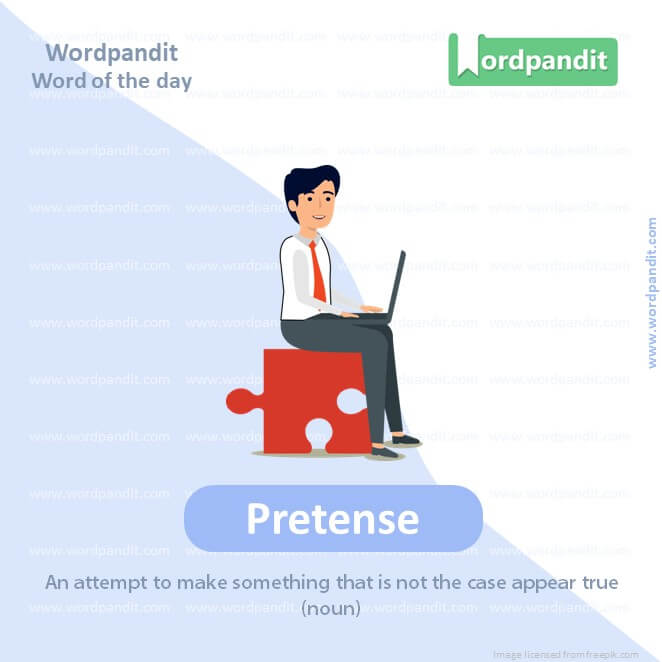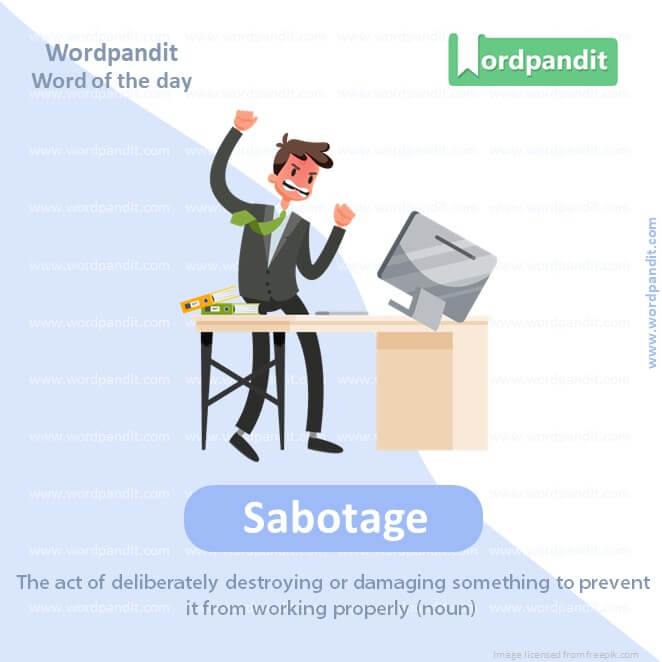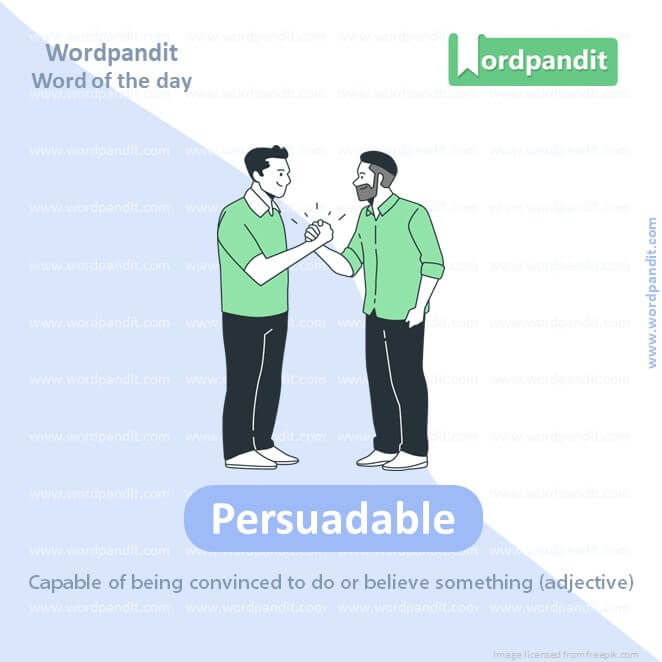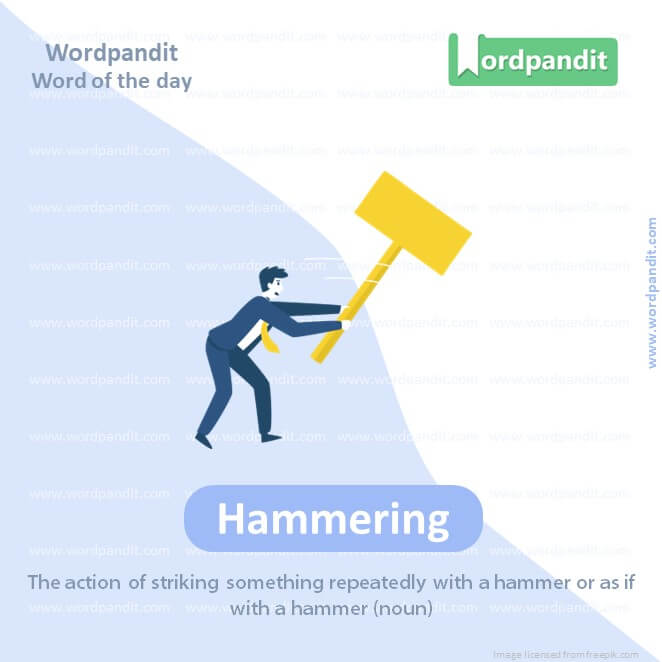Daily Vocabulary Words: List of Daily Used Words in Leading International Newspapers
Hi there. Welcome to this special section @ Wordpandit.
Our endeavour here is very simple: to highlight important daily vocabulary words, which you would come across in leading newspapers in the country. We have included the following newspapers in our selection:
• The New York Times
• The Washington Post
• Scientific American
• BBC
• The Guardian
• Psychology Today
• Wall Street Journal
• The Economist
We are putting in extensive work for developing your vocabulary. All you have got to do is be regular with this section and check out this post on a daily basis. This is your repository of words that are commonly used and essentially, we are posting a list of daily used words. Hence, this has significant practical application as it teaches you words that are used commonly in leading publications mentioned above.
Visit the website daily to learn words from leading international newspapers.

WORD-1: Pretense
CONTEXT: I make no pretense of expertise in poll analysis, I, like some others, suspect that this election may be more significant than pure number crunching suggests.
SOURCE: New York Times
EXPLANATORY PARAGRAPH: Pretense is when you act like something is true when it really isn’t. It’s like when you pretend to be a superhero, even though you don’t have superpowers. You’re just playing or trying to make others believe something that’s not real.
MEANING: An attempt to make something that is not the case appear true (noun).
PRONUNCIATION: PREH-tens
SYNONYMS: Sham, façade, guise, charade, act, pretension
USAGE EXAMPLES:
1. She dropped her pretense of being interested in the conversation.
2. They saw through his pretense of confidence.
3. Under the pretense of being sick, he avoided going to school.
4. The meeting was a pretense for them to discuss other matters.

WORD-2: Sabotage
CONTEXT: The starting point here is that our political system may be unique among democracies in its vulnerability to sabotage by a ruthless opposition party.
SOURCE: New York Times
EXPLANATORY PARAGRAPH: Sabotage is like when you’re building a sandcastle, and someone else comes along and kicks it down on purpose. They ruin what you’re making or trying to do, not by accident, but because they want to stop you or cause trouble.
MEANING: The act of deliberately destroying or damaging something to prevent it from working properly (noun).
PRONUNCIATION: SAB-uh-tahj
SYNONYMS: Undermine, wreck, disrupt, vandalize, subvert, impair
USAGE EXAMPLES:
1. The factory machinery was sabotaged, causing a halt in production.
2. They were accused of sabotage against the company’s systems.
3. Efforts to sabotage the peace talks were evident.
4. The team suspected sabotage when their project files went missing.

WORD-3: Persuadable
CONTEXT: The economy improving and persuadable voters beginning to recognize that improvement, the focus of the 2024 campaign.
SOURCE: New York Times
EXPLANATORY PARAGRAPH: Persuadable means someone can change your mind about something because they listen to reasons or arguments. It’s like when you don’t want to eat your veggies, but someone explains why they’re good for you, and you decide to try them.
MEANING: Capable of being convinced to do or believe something (adjective).
PRONUNCIATION: per-SWAY-duh-buhl
SYNONYMS: Swayable, influenceable, receptive, open, amenable, pliable
USAGE EXAMPLES:
1. She was persuadable, eventually agreeing to join the team.
2. The audience was more persuadable than he anticipated.
3. With the right evidence, they found the jury to be persuadable.
4. His parents were persuadable with a well-reasoned argument.

WORD-4: Maneuvering
CONTEXT: This polling reflects an electorate that for the most part hasn’t been following the legislative maneuvering.
SOURCE: New York Times
EXPLANATORY PARAGRAPH: Maneuvering is moving or planning in a clever way, like when you carefully move your toy car around obstacles or figure out how to get the last piece of cake without anyone noticing. It’s being smart about how you move or make plans.
MEANING: Skillful or strategic moving or planning (noun).
PRONUNCIATION: muh-NOO-ver-ing
SYNONYMS: Navigating, steering, scheming, tactics, strategy, manipulation
USAGE EXAMPLES:
1. The driver’s expert maneuvering avoided an accident.
2. Maneuvering through the crowded market was a challenge.
3. His political maneuvering helped him win the election.
4. She admired his maneuvering in securing the deal.

WORD-5: Hammering
CONTEXT: The prospect of an election in the near future, with Democrats hammering home the point that they are supporting border security measures while Republicans are blocking them.
SOURCE: New York Times
EXPLANATORY PARAGRAPH: Hammering is like when you use a hammer to hit nails into wood. It’s the action of banging or striking something hard, again and again, to make something or fix something, like building a birdhouse or putting a picture on the wall.
MEANING: The action of striking something repeatedly with a hammer or as if with a hammer (noun).
PRONUNCIATION: HAM-er-ing
SYNONYMS: Pounding, beating, banging, thumping, knocking, bashing
USAGE EXAMPLES:
1. The constant hammering from the construction site was loud.
2. He spent the afternoon hammering the fence posts into the ground.
3. The sound of hammering echoed through the neighborhood.
4. Her headache felt like constant hammering inside her head.
WORD-6: Obstructionism
CONTEXT: The border issue by staking out a tough position — basically the same position now held by Biden — while attacking Republicans for their obstructionism.
SOURCE: New York Times
EXPLANATORY PARAGRAPH: Obstructionism is when someone keeps trying to stop or slow down what others are trying to do. Imagine you and your friends are trying to build a fort, but one friend keeps taking away the pillows or blocks you’re using. They’re not helping; they’re making it harder for everyone else.
MEANING: The practice of deliberately delaying or preventing progress or change (noun).
PRONUNCIATION: ob-STRUHK-shuh-nizm
SYNONYMS: Hindrance, blocking, opposition, impediment, resistance, obstruction
USAGE EXAMPLES:
1. The senator was accused of obstructionism during the legislative process.
2. Obstructionism by a few members stalled the project for months.
3. They faced obstructionism from those who opposed the new policy.
4. His obstructionism was frustrating for those wanting swift action.
WORD-7: Fibbing
CONTEXT: Donald Trump gets a roughly $355 million fine for fibbing about his fortune.
SOURCE: New York Times
EXPLANATORY PARAGRAPH: Fibbing is when you tell a small lie, usually not a big deal, like saying you didn’t eat the last cookie when you did. It’s not telling the truth about something small to avoid trouble or because you’re trying to be sneaky.
MEANING: Telling small or trivial lies (noun).
PRONUNCIATION: FIB-ing
SYNONYMS: Lying, prevaricating, fabricating, misleading, deceiving, falsifying
USAGE EXAMPLES:
1. He was caught fibbing about finishing his homework.
2. Fibbing about your age to get a discount is not honest.
3. She regretted fibbing to her friend about where she was.
4. Fibbing can hurt trust, even if the lies are small.
WORD-8: Chortling
CONTEXT: I would never want to stop you from chortling, but here goes: I think the case was ridiculous and the verdict outrageous.
SOURCE: New York Times
EXPLANATORY PARAGRAPH: Chortling is a happy sound you make when something is funny. It’s like laughing, but a bit quieter and sometimes you make a snorting sound too. It’s showing you think something is really amusing or silly.
MEANING: Laughing in a breathy, gleeful way; a chuckle (noun).
PRONUNCIATION: CHOR-tling
SYNONYMS: Chuckling, giggling, laughing, snickering, sniggering, guffawing
USAGE EXAMPLES:
1. They were chortling at the cartoon’s antics.
2. His joke made everyone start chortling.
3. She couldn’t help chortling when she heard the funny mistake.
4. The room was filled with the sound of chortling children.
WORD-9: Inadequacy
CONTEXT: I realize Trump lies about most everything, probably owing to feelings of inadequacy about his … apartment size.
SOURCE: New York Times
EXPLANATORY PARAGRAPH: Inadequacy is feeling like you’re not good enough or don’t have what it takes to do something. It’s like when you think you can’t run as fast as your friends or draw as well, and it makes you feel a bit sad or worried.
MEANING: The state of being insufficient or not good enough (noun).
PRONUNCIATION: in-AD-eh-kwuh-see
SYNONYMS: Insufficiency, deficiency, shortcoming, weakness, limitation, shortfall
USAGE EXAMPLES:
1. She felt a sense of inadequacy compared to her more experienced colleagues.
2. The inadequacy of the old computer system was obvious.
3. He struggled with feelings of inadequacy as a parent.
4. The project’s failure highlighted the inadequacy of their planning.
WORD-10: Defrauded
CONTEXT: You have Trump being accused of fraud without any of his creditors complaining of being defrauded, making the case ripe for being overturned on appeal or at least the amount he has been fined reduced.
SOURCE: New York Times
EXPLANATORY PARAGRAPH: Defrauded is when someone tricks you to take something from you, like money or something important. It’s like if someone told you they would give you a toy for your allowance, and then they take your allowance but never give you the toy.
MEANING: Cheated out of money or property (verb).
PRONUNCIATION: de-FRAWD-ed
SYNONYMS: Swindled, cheated, conned, tricked, deceived, duped
USAGE EXAMPLES:
1. She realized she had been defrauded when the product never arrived.
2. The company was fined for having defrauded its customers.
3. He was arrested for defrauding investors out of millions.
4. Many elderly people are defrauded by scams each year.
Vocabulary Meaning
In the ocean of language learning, ‘vocabulary meaning’ is akin to the colorful coral reefs that add depth and vibrancy to communication. Yet, infusing our interactions with this vibrancy is often a challenge for many language learners. The crux lies in effectively deciphering and employing the ‘vocabulary meaning’.
Learning ‘vocabulary meaning’ isn’t about merely gluing words to their definitions. It’s about forming a deep understanding and connection with these words that transcends rote learning. To gain a comprehensive grasp of ‘vocabulary meaning’, one needs to navigate beyond textbook definitions and commit to exploiting diversified resources such as novels, films, music, articles, and digital content. This allows one to encounter vocabulary in a variety of contexts and actual usage, giving deeper insight into their meaning.
However, understanding ‘vocabulary meaning’ involves another essential aspect—memory retention. Techniques such as spaced repetition and the Leitner System offer effective methodologies to maintain and consolidate the ‘vocabulary meaning’. Additionally, leveraging mnemonic strategies can help etch words into your memory by linking them with unique stories or imagery that are personal and easily recallable.
Another way of mastering ‘vocabulary meaning’ is by immersing yourself in the language. Engage in regular conversations with native speakers if possible or utilize language exchange platforms to practice your skills. This not only bolsters your understanding of how the vocabulary is used but also helps articulate the ‘vocabulary meaning’ in the societal and cultural contexts.
In conclusion, gaining a robust grasp of ‘vocabulary meaning’ is a journey rather than an end goal. It requires dedication, perseverance and most importantly, a multi-faceted approach that includes diversified resources, effective memory strategies, and real-life application. With these strategies in place, the depths of ‘vocabulary meaning’ are no longer daunting but become an enchanting exploration of language.











